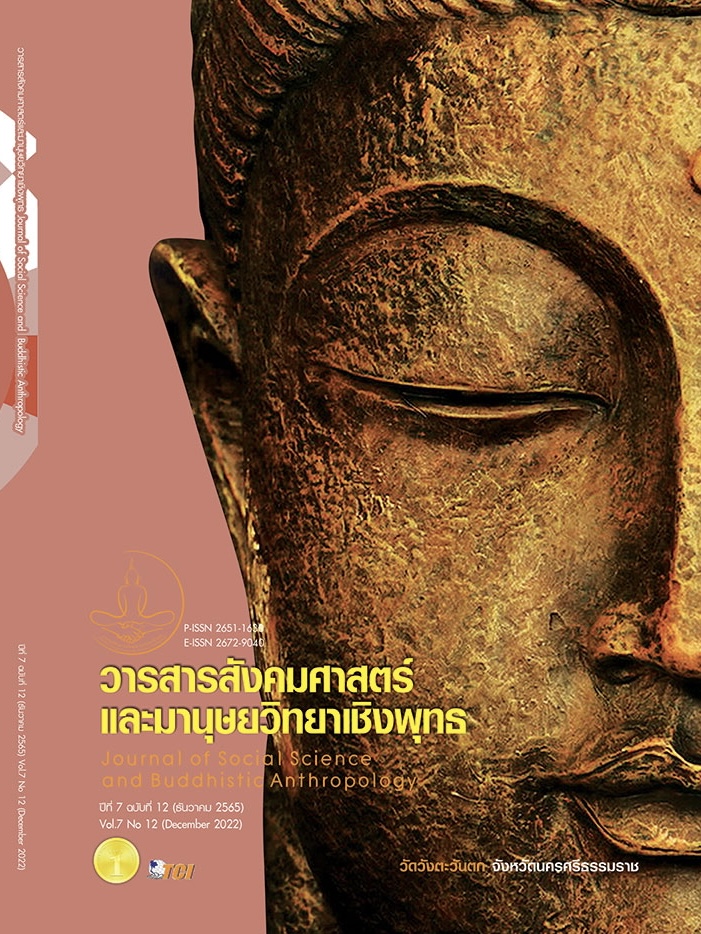DEVELOPMENT OF GUIDED PLAY LEARNING EXPERIENCES MODEL USING THINGKING ROUTINE AND INTENTIONAL TEACHING APPROACHES TO PROMOTE INQUIRY SKILLS OF KINDERGARTENERS
Keywords:
Experiences Model, Guided Play, Thingking Routine Approach, Intentional Teaching Approach, Inquiry SkillsAbstract
The purpose of this research article was to develop a guided play experience model based on thinking routines and intentional teaching approaches to promote inquiry skills of kindergarteners. The subjects used in the study were 20 boys and girls, aged between 5 - 6 years old. They were studying in kindergarten level 3 schools in district of Pathum Thani province. This study was a research and development. The study procedures were into 2 phases. Phase 1 studying and analyzing the basic data to develop a model which consisted of studying the related documents and determination of inquiry skills. Phase 2 constructing and evaluating the guided play learning experiences model. The sample was 5 experts selected using Purposive Selection in curriculum and instruction field; and an early childhood education field. The research instrument was the consistency index evaluation form. Data were analyzed by using arithematics mean and standard deviation. The research finding showed that the guided play experience model which was developed by using the concept of thinking routines comprised of principles, objectives, 4 steps of teaching as preparation 1) Step 1: Think Brainstorm 2) Step 2: Think, Touch, Recognize 3) Step 3: Think, Play, Create, 4) Step 4: Visualize. The appropriateness of consistency index for guided play learning experiences model was at the highest level ( = 4.60, SD = 0.52). The results of expert opinion and pilot study indicated a guided play experience model based on thinking routines and intentional teaching approaches combined with purposeful teaching can be used to organize experiences that lead to encouragement. Kindergarten children are capable of observing, questioning, exploring, and communicating appropriately for the benefit of the Kindergarteners.
References
กระทรวงศึกษาธิการ. (2560). แผนการศึกษาแห่งชาติ. พ.ศ. 2560 – 2579. เรียกใช้เมื่อ 12 พฤษภาคม 2563 จาก http://www.onec.go.th/index.php/book/BookView /1540.
พวงรัตน์ ทวีรัตน์. (2540). วิธีการวิจัยทางพฤติกรรมศาสตร์และสังคมศาสตร์. (พิมพ์ครั้งที่ 7). กรุงเทพมหานคร: สำนักทดสอบทางการศึกษาและจิตวิทยา มหาวิทยาลัยศรีนครินทร์วิโรฒ ประสานมิตร.
ยศวีร์ สายฟ้า. (2014). รอยเชื่อมต่อการเรียนรู้ระหว่างชั้นเรียนอนุบาลและประถมศึกษา: ก้าวย่าง ที่สำคัญของเด็กประถมศึกษา. Journal of Education Studies, 42(3), 143-159.
สำนักงานคณะกรรมการการศึกษาแห่งชาติ, สำนักนายกรัฐมนตรี. (2542). พระราชบัญญัติการศึกษาแห่งชาติ พ.ศ.2542 แก้ไขเพิ่มเติม (ฉบับที่ 2) พ.ศ. 2545. กรุงเทพมหานคร: พริกหวานกราฟฟิคจำกัด.
สำนักงานคณะกรรมการพัฒนาเศรษฐกิจและสังคมแห่งชาติ. (2560). แผนพัฒนาเศรษฐกิจ และสังคมแห่งชาติฉบับที่ 12 (พ.ศ. 2560-2564). เรียกใช้เมื่อ 12 มกราคม 2563 จาก http://www.nesdb.go.th
Center for Science, M.& E. E. (2000). Inquiry and the National Science Education Standards: A Guide for Teaching and Learning. Washington, D.C.: National AcademiesPress.
Chigeza, P. & Sorin, R. (2016). Kindergarten children demonstrating numeracy concepts through drawings and explanations: Intentional teaching within play-based learning. Australian Journal of Teacher Education, 41(5), 65-77.
Epstein, A. S. (2014). The intentional teacher: Choosing the best strategies for young children’s learning. Washington, DC: National Association for the Education of Young Children.
Fisher, K. R. et al. (2013). Taking shape: Supporting preschoolers' acquisition of geometric knowledge through guided play. Child development, 84(6), 1872-1878.
Harlen, W. (2014). Helping children’s development of inquiry skills. Inquiry in primary science education, 1(1), 5-19.
Harrison, C. (2014). Assessment of Inquiry Skills in the SAILS Project. Science Education International, 25(1), 112–122.
Hsin, W. & Chou, H. (2019). Developing Sixth Graders ’ 1 Running head: DEVELOPING INQUIRY SKILLS TO CONSTRUCT EXPLANATIONS Developing Sixth Graders’ Inquiry Skills to Construct Explanations in Inquiry-based Learning Environments. Retrieved March 13, 2013, from from https://ezproxy.car. chula.ac.th :2883/login.aspx?direct=true&db=
edsbas&AN=edsbas. 26AD9930&site=eds-live http://ezproxy.car.chula. ac.th/login?url=https://search.ebscohost.com/login.aspx?direct=true&db=edsbas&AN=edsbas.26AD9930&site=eds-live
Jung, M. & Conderman, G. (2013). Intentional Mathematics Teaching in Early Childhood Classrooms. Childhood Education, 89(3), 173-177.
Kilderry, A. (2015). Intentional Pedagogies: Insights from the Past. Australasian Journal of Early Childhood, 40(3), 20-28.
Kuhn, D. & Pease, M. (2008). What needs to develop in the development of inquiry skills? Cognition and Instruction, 26(4), 512-559.
Lanphear, J. & Vandermaas-Peeler, M. (2017). Inquiry and Intersubjectivity in a Reggio Emilia-Inspired Preschool. Journal of Research in Childhood Education, 31(4), 597-614.
Ritchhart, R. & Perkins, D. (2008). Making thinking visible . Educational Leadership, 65(5), 57-61.
Ritchhart, R. et al. (2011). Making Thinking Visible: How to Promote Engagement, Understanding, and Independence for All Learners. Jossey-Bass: An Imprint of Wiley.
UNESCO. (2011). Ensuring quality by attending to inquiry: Learner-centered pedagogy in sub-Saharan Africa. (4). Addis Ababa. Ethiopia Layout and Graphic Design: Daniel.
Wang, F. et al. (2009). Applying Technology to Inquiry-Based Learning in Early Childhood Education. Online Submission. Online Submission. Retrieved March 13, 2021, from
https://ezproxy.car.chula.ac.th:2883/login. aspx?direct=true&db=eric&AN=ED526192&site=eds-live
Wolberg, R. I. & Goff, A. (2012). Thinking Routines: Replicating Classroom Practices within Museum Settings. Journal of Museum Education, 37(1), 59-68.
Zimmerman, C., & Klahr, D. (2018). Development of scientific thinking. Stevens' handbook of experimental psychology and cognitive neuroscience, 4(Developmental and Social Psychology), 1-25.
Downloads
Published
How to Cite
Issue
Section
License
Copyright (c) 2022 Journal of Social Science and Buddhistic Anthropology

This work is licensed under a Creative Commons Attribution-NonCommercial-NoDerivatives 4.0 International License.









